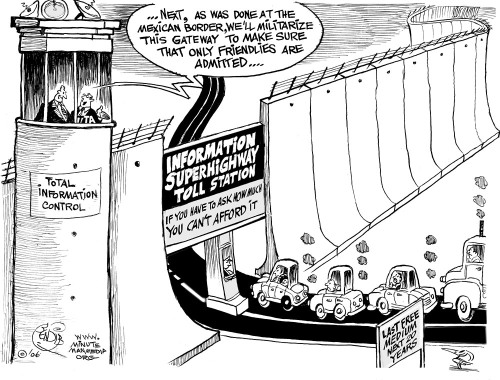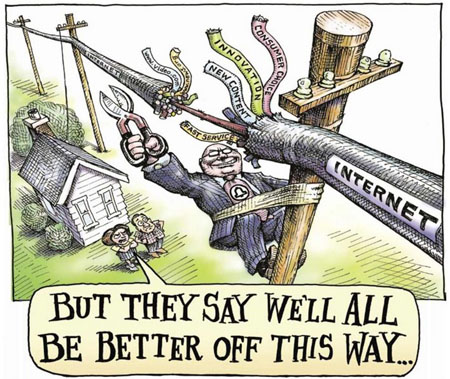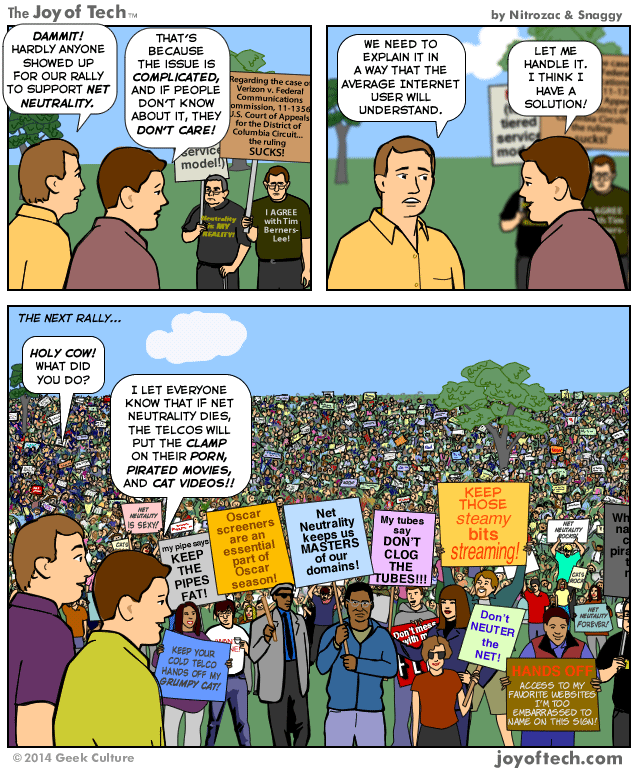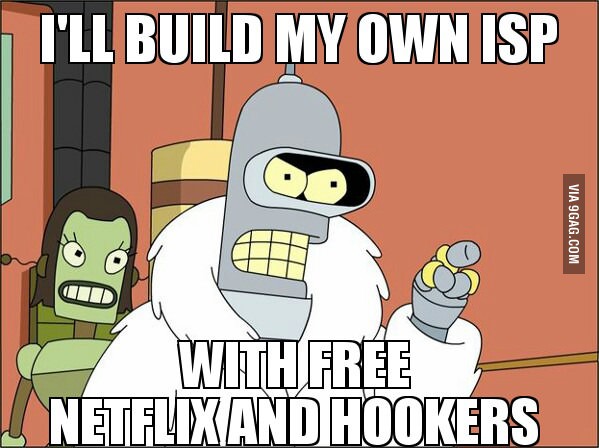There’s still a lot of confusion about net neutrality and why it matters. And no wonder people are confused, even the media often gets it wrong. Take for example this recent statement from Real Time With Bill Maher.
There’s a big misunderstanding about what net neutrality actually is. What’s happening is you have certain companies like Hulu and Amazon, they’re streaming videos, and that actually takes up a lot of bandwidth. And so what they’re trying to do is make it such that those people pay more. Why should they pay as much as the woman on Etsy selling hair bows?
The point of regulation is not to be neutral. It’s to protect the little guy. It’s to create competition. Where we don’t have competition right now is with broadband providers. There’s very few of them. We need to have more competition in this space so that all of this flow continues to flow. I actually think a lot of politicians don’t really understand the issue. People making the rules really need to be under 32 to get this right.
Monica Mehta on Real Time with Bill Maher, proving she is over the age of 32
Bill Maher goes on to verify he too has no idea how the Internet works with two simple words, “good point.”
Nope, noppity nope. Mehta’s heart may be in the right place, but her facts are painfully wrong. You can listen to Monica Mehta’s quote on net neutrality here, it begins at 47:30 and goes on for a minute…one little minute, and yet this statement is riddled with problems.
Now to unravel all the ways she got it wrong, so you don’t make the same mistake.
1. Mehta is Confusing a Web Host With an Internet Service Provider (ISP)

Big companies do pay more for streaming video. They pay that money to their web hosts, which provides the computers where their websites live. Granted, a big company like Netflix probably owns their own servers, but they are definitely paying a lot more for bandwidth than some seller on Etsy.
(Further showing her lack of clarity on this, the gal on Etsy pays $0 to a web host—instead she pays Etsy to use their site and then Etsy pays a web host, but that’s nitpicking and besides the larger point.)
Every person who visits a web page is downloading data from the web host, so the more visitors a site has, the more they will have to pay in bandwidth fees. These transactions are between the company and the web host, they have nothing to do with the Internet Service Provider (e.g. Comcast).
Comcast is not hosting the sites for these big companies, they simply provide the pipe that sends it into your laptop and living room. They are a middle man, and in the tradition of middle men everywhere, they now want to charge extra fees. Net neutrality is about not allowing them to do that.
2. Those Opposed to Net Neutrality Aren’t Advocating Government Regulation

In this particular case, they want to charge Netflix more because Netflix competes with them as a cable provider. It would be like Barnes & Noble marking up the price on all copies of The Idiot’s Guide to Amazon.com. That’s all fine and dandy until Barnes and Noble is the only bookstore in town, which is the case for most Internet Service Providers.
Which leads us to…
3. We Do Need More Broadband Competition, But We Also Need Net Neutrality

Where we don’t have competition right now is with broadband providers. There’s very few of them. We need to have more competition in this space so that all of this flow continues to flow.
Here’s the part of the quote that Mehta gets right: we do need more competition among Internet Service Providers. I think a lot of people in the audience identified with this statement, and who wouldn’t—every one of us has had some stupid issue with our ISP that would never happen if they had to compete with companies that provide decent customer service.
While the audience may be with her, she lost me in that last line: so that all of this flow continues to flow. I think what she’s getting at there is the idea that without some kind of government regulation, the Internet will stop being the Internet we know and love today.
Even if there were 100 different ISPs in each city, net neutrality could still be a problem so long as each of them decides to limit access to this and that website. We could end up in a world where ISPs are skewed by the kind of person you are. Fox News fans choose an ISP that blocks Democratic fundraising sites while vegetarians have a cable company that charges extra to sites like bacon.com. If you think we already live in a world where people read only what they want to believe, imagine a future where the Internet they see only allows them access to websites that fit with their worldview.
The flow is flowing just fine, thankYouVeryMuch, so long as the ISPs leave it alone.
It’s unclear here what she means by “government regulation”. If all it means is “hey, Comcast, you’re not allowed to limit access or speed to various websites,” then swell. That’s all net neutrality advocates are asking for. But it sounds like she’s suggesting that the government do what Comcast is doing: regulating what sites Americans can access, and that is potentially confusing to those who don’t understand this issue. The answer to Comcast deciding to limit access to various sites is not to get the government involved doing more of that very same thing…just ask the Chinese.
If you’re with Mehta on this, you’re probably thinking: so what if big companies like Netflix have to pay a little more to Comcast? But here’s where her statement becomes painfully wrong.
4. Ultimately, Allowing Comcast and ISPs to Charge Websites Will Hurt the “Little Guy”

- If Comcast can slow down access to this and that site, what’s to stop them from charging more to political sites that the company has lobbied against?
- What’s to stop them from extorting small websites (e.g. your sister’s wedding registry, or a small site for an obscure hobby you have) by charging a nuisance fee, under threat of slowing down access to their websites?
- What’s to stop other companies from paying Internet Service Providers to block their competition?
- If Comcast and other ISPs are given the ability to make some sites faster to access then others, why shouldn’t they be allowed to cut off access to some sites all together?
[via 9Gag]
What’s beautiful and amazing about the Internet is the unfettered access to whatever ideas we can dream up. There are cute kittens and nasty porn. There are sites for feisty atheists and sites for Bible study. Whatever flavor you crave, there is a website for it. Net neutrality is about protecting that freedom, your freedom, to visit any kind of website. Without that freedom, the Internet will no longer be bottom-up, but instead controlled from the top down, like the boring old cable TV and corporate radio options we had before. No wonder Comcast is eroding net neutrality: they want to reduce the Net to a different variety of what they’re already selling.
But I think the rest of us know that the Internet we know and love today is so much more than “57 channels and nuthin’s on.” It’s a wild west where anyone who wants to hang their sign can have a website, no matter how small or unpopular their voice. That’s what we’re trying to protect.
EDIT: Watch John Oliver on Last Week Tonight explain net neutrality. At the end of the video he’ll compel you to add your name to the FCC comments, a fine idea. To add your comments go to http://www.fcc.gov/comments and it’s proceeding number 14-28 Protecting and Promoting the Open Internet, right at the top.


DaGoat We need health care reform — desperately. We did not need Bush's war — at all.We also do not need a bad health care reform plan. I think it is possible to do a good job on health care reform, but there is no reason to rush it through. I've listened to Obama's speeches including the one today at Cleveland Clinic. He's long on promises but short on specifics.